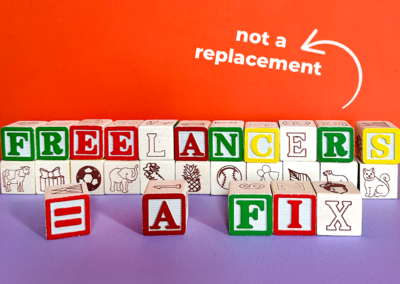I watched the LuLaRich documentary recently. Like many others, I was fascinated and shocked concurrently. There is much to say about the scam the Founders were running, the way they mistreated their team of consultants, and the low quality products they were peddling, but what has stuck with me the most since watching it last week is how obvious it is that stay at home moms are a massive untapped resource with a very entrepreneurial spirit. In the documentary, they show a ticker of moms signing up to self-finance and launch their own side hustle business selling LulaRoe products. The LLR consultant base grew at an astounding rate, over 80,000 since its inception, according to Yahoo! News.
The women were drawn in by the ability to contribute financially to their family, interact with and have community with other adults, and work in a way that was as flexible as the demands of motherhood require. LulaRoe was their golden ticket- or so they thought, and they were all in, effectively building a billion dollar business in just a few years for leadership that was scamming them. I’m imagining what those women could do if they weren’t being scammed, if they were offered a sustainable and legal path to income and camaraderie that satisfied their desire to have meaningful work, while also fulfilling their commitments to their life outside of work.
This made me reflect on something I’ve been thinking about a lot lately – are we ready to use this moment (gestures broadly to everything we thought we knew being questioned, thrown out, and reconsidered) to incorporate people into the workforce that we have historically and systemically ignored, underestimated, and shut out? Stay at home moms (or dads) are certainly one group, but what about the formerly incarcerated, immigrants, refugees, the partially retired, people that are neuro-diverse, and beyond? How many people in these groups, like the women at LuLaRoe, are starved for opportunity and ready to meaningfully contribute, but just can’t get their shot to do so? All of these underestimated and overlooked groups have a wide variety of skills and perspectives that are hugely valuable (not to mention they are often a part of your target market) and we will all be better for it once they are put to work, welcomed, and celebrated for all they have to offer the workforce. We’re re-imagining everything right now. Can we reimagine what inclusion looks like?
I’ve written about how we have to think differently to navigate the no-end-in-sight talent shortage that is rocking our collective talent world. We’ve all seen the articles and stats on the talent shortage, the number of people who have retired early since the pandemic, and the number of women who have left the workforce altogether in the past year. This is a problem that will require creative thinking and I can assure you that doing what we’ve always done will not work. The goalposts have moved, we’re playing a new game, the rules have changed. How many ways can I say it?
A few days ago, I asked a simple question on twitter “Marketers, could you do your job without a college degree?” As of the time of this writing, over 200 marketers had responded with a resounding YES. The majority sentiment is that most of the people who replied felt quite strongly that they could do their current job without a degree. Some of them are CMOs. I wonder how many of them are in leadership positions at companies who have a policy of requiring a degree to work on their team? I wonder how much talent they’ve collectively missed out on because of this old-world thinking that a degree is a requirement for marketing and corporate work? Let’s add folks that haven’t gone to college to the list of people we’ve been overlooking for far too long. I am sure I will have more to add to the list tomorrow and the day after that and the day after that, as the foundations of how we have set up corporate America are exclusionary and working counter to our inclusion and belonging desires every day.
And on top of all of this–hold onto your hats for this one, per this WaPo article, “there are 1.8 million job openings in professional and business services and fewer than 925,000 people whose most recent job was in that sector”. This means that about 1 in 2 new hires in corporate America would need to come from a different sector- or I might post, from the many groups of people who are underemployed and unemployed due to the systemic exclusion created by our way of working and evaluating potential talent.
On one hand, so many marketers are feeling the pain of a seemingly very tight labor market. And on the other hand, there is absolutely slack in the talent system. In an article from Adweek on the tough labor market, writer Alexandra Carter says “In the throes of a fiercely competitive talent market, some agencies are finding themselves being outbid by upwards of $50,000 for talent. Shops of all sizes have had to adapt to a new way of hiring”. There are people hungry to work that will require us to think differently about how we can help them succeed here. Are we up for the challenge?




